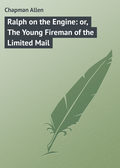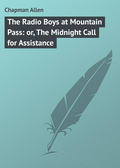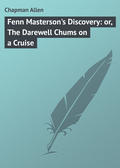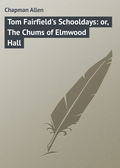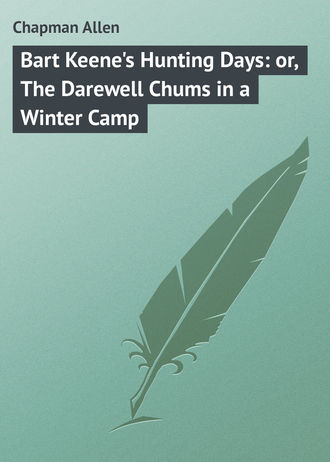
Chapman Allen
Bart Keene's Hunting Days: or, The Darewell Chums in a Winter Camp
“We – we don’t know,” faltered Fenn. “I was shooting at a can, but I missed it. I didn’t know anybody was in the bushes.”
Bart hurried into the house to telephone for a physician, while Alice in the rôle of a red-cross nurse, hurried on toward the fence. The shouts were growing fainter now. The boys, with white faces, followed her.
CHAPTER VIII
AN ODD LETTER
“Suppose he is dead?” faltered Fenn, as he stumbled along. “Will – will I be arrested.”
“Don’t worry until you see who it is, and how badly he is hurt,” advised Frank. They were soon at the fence. Ned and Frank parted the bushes that grew higher than the topmost rail, and plunged on through. Fenn followed, but Alice was going farther up, where she knew there was a gate.
The sight that met the eyes of the boys was most reassuring. Standing up on his big wagon was Jed Sneed, calmly pitching off cord wood into a pile. The fuel was evidently for Bart’s house.
“Were you – are you – that is – you aren’t dead; are you?” gasped Fenn. “Is – is anybody?”
“Not that I know of,” answered Jed, as he straightened up. “But I come pretty nigh bein’. As nigh as I want to. I just heard a bullet sing over my head, as I was stooping down to get hold of a stick. Who was shooting, anyhow?”
“I – I was,” faltered Stumpy. “I missed the tin can I aimed at. Did I come very close to you?”
“I didn’t take time to measure the distance,” announced Jed dryly, “but it was close enough.”
“We heard you yell,” said Frank, “and we thought some one was killed. We didn’t know it was you.”
“I was hollering at the horses, partly,” explained the man. “The pesky critters won’t stand still when they hear shootin’. So it was you fellows; eh? Well, I ought to have knowed better than to come out with this load of wood to-day. Jest as I was startin’ a black cat run right across the road in front of the horses, and that’s one of the very worst kind of bad signs. I should have turned back, but Mr. Keene wanted this wood to-day, so I kept on. Then, as if one warnin’ wasn’t enough, I had another. Jest as I was turnin’ in this back way, thinkin’ it would be a little shorter, three crows flew over my head, goin’ South. They must have stayed up pretty late, but there’s no worse sign than three crows, unless it’s to meet a snake with his tail toward you. But, as Mr. Keene wanted the wood, I come on, and look what was the result – I was nearly killed.”
“Oh, I guess the bullet didn’t come so near you as you thought,” suggested Ned, partly for Fenn’s benefit. “Fenn usually fires high, and he missed the can clean. Then, you’re down in a sort of hollow here, and I guess it was well over your head.”
“I hope so,” remarked Jed. “A miss is as good as a mile, I guess. Still, it was partly my own fault, for not payin’ attention to them signs. You can make up your minds I won’t tempt fate that way again. I’ll turn back next time when a black cat crosses in front of me. And then, too, I ought to have give you chaps warnin’. I heard you shootin’ as I drove up, and then, when it stopped, I s’posed you was done. Then when that one shot came, and whizzed over my head, I thought it was all up with me. I hollered some, to let you know I was here, and to quiet the team. Then I went on tossin’ off the wood.”
Fenn breathed easier. Some color was beginning to come back into his cheeks. A moment later Alice came hurrying along, having found the gate.
“Is he badly hurt?” she asked. “Have they got him in the wagon? Perhaps you’d better drive right to the hospital Mr. Sneed,” for she knew the teamster, who did odd jobs around town.
“Wa’al, I don’t mind drivin’ to the hospital for ye,” announced Jed with a grin, “but there ain’t no need for it.”
“Don’t tell me he’s – ” but Alice paused, not willing to utter the fatal word. Several rolls of bandages fell from her hands.
“Oh, I’m all right,” went on Jed. “I’ll live to be an old man if I wait to be shot, I guess. Whoa, there, ponies,” this last to his team.
“Then isn’t any one hurt?” asked Alice, and though she was undoubtedly glad of it, there was a distinct note of disappointment in her voice.
“No one,” explained Ned, as he told how it had happened. Jed took part of the blame, for not announcing his presence, but, nevertheless, Fenn was a bit shaky for some time after the incident, and Ned and the others were nervous.
“The doctor will be right over!” suddenly cried Bart, bursting through the bushes. “Who is it, and is he badly hurt?” Then he had to be told how it was, and he hurried back into the house to countermand the order for the physician. Alice gathered up her bandages, and with her box of remedies retraced her steps. She had missed a chance to practice for her chosen profession, but she was glad of it.
A more careful investigation of how Fenn had stood when he shot, and a calculation of the angle at which he held the rifle, showed that the bullet must have gone well over Jed’s head, so it was not so bad as at first thought.
“But it was mostly my own fault,” concluded the odd man, as he drove away. “Never again will I keep on when I see a black cat – ” He stopped suddenly, checked his team, and got out of the empty wagon.
“What’s the matter now?” asked Frank.
“There’s a horseshoe in the field there, and it’s turned the wrong way for luck,” explained Jed, as he picked it up. “I was drivin’ right toward it – must have come off one of my horses when I was comin’ around to get a good place to toss off the wood.”
“Anyway it had the curved, or open side, toward me, and if you go toward a horseshoe that way it’s a sure sign that you’ll have no luck in a year. A mighty sure sign, too.”
“What are you going to do?” asked Bart, as he saw Jed put the shoe back on the ground again.
“Oh, I just turned it around again. Now I can drive toward it right, and I’ll have good luck – you see,” which he proceeded to do, and, after his wagon had passed the shoe, he got out again, picked it up, and then went on, well satisfied with himself.
As the days went on the weather grew colder. There were frequent snow storms, and the snow did not melt. The Christmas holidays were approaching, and the boys were preparing for camp life, each lad having secured permission to take some time out of school.
One night, when the four chums were at Fenn’s house, getting ready some things, and talking of the fun they expected to have, there came a knock on the front door. As the boys were the only ones downstairs, Fenn volunteered to answer it.
“Though I don’t know who can be calling at this hour,” he remarked, for it was nearly ten o’clock. He opened the door, and his startled exclamation brought his chums to his side.
“There’s no one here!” cried the stout lad, “but I was sure I heard a knock – didn’t you?”
“Sure,” replied Bart, and the others nodded. “There has been some one here,” went on Bart. “See the footprints in the snow. It’s snowed since we came. Some one ran up, knocked, and ran away again.”
“I wonder what for?” murmured Fenn, looking up and down the deserted street. “Probably a joke. Maybe it was Sandy Merton.”
“Whoever it was, he left something,” said Frank, suddenly.
“What?” asked Fenn.
“This letter,” answered Frank, picking up a missive from the doorstep. The white envelope, so much like the snow, had not at first been noticed.
“Bring it in and see what it says,” proposed Bart, and soon, under the light of the gas in the dining-room, the boys were perusing the strange missive.
“It’s to me,” said Fenn, as he rapidly scanned it. “But what in the world does it mean? And it has no signature. Listen to this fellows,” and he read:
“‘MR. FENN MASTERSON,
“‘Dear Sir: – I understand you have quite a collection of mud turtles. Would you be willing to part with them? I mean for a consideration, of course. If you would kindly communicate with me. I will pay you a good price for all the turtles you have. But I must make this stipulation, which, at first may seem odd to you. But I have a reason for it. I can not meet you personally. If you are willing to sell your turtles will you write a note to that effect, and leave it in the dead sycamore tree on the edge of Oak Swamp? That is the only way in which you can communicate with me. Kindly let me hear from you soon.’”
As Fenn had said, there was no signature. He turned the strange letter over and looked at the back. It was blank.
“Well, wouldn’t that jar you!” exclaimed Bart, as he took the note from Fenn’s hand.
CHAPTER IX
OFF TO CAMP
“This must be a joke,” remarked Fenn, at length, after he had once more read the note. “Sandy Merton, or some of the other fellows, who want to have some fun with us, wrote that.”
“I think not,” said Frank, thoughtfully.
“Why?” inquired Ned.
“Some man wrote that,” went on Frank. “That’s no boy’s handwriting. There’s too much character to it. What are you going to do about it, Fenn?”
“Nothing, I guess. Of course, I’d sell my turtles and things, if I got a chance, for I think I’m going to collect different kinds of wood now, and – ”
“What did I tell you?” interrupted Ned triumphantly. “I knew Fenn’s fad wouldn’t last much longer.”
“It would, if we weren’t going camping,” declared the stout youth, with vigor. “Only when I’m away there’ll be nobody to look after the things. Mother is afraid to feed ’em, and dad won’t, so if I had a good chance to get rid of ’em I’d do it. Only I wouldn’t do business with a fellow like this, who doesn’t sign his name, and who wants me to act as if I was leaving money in response to a black-hand note. I’ll not pay any attention to it.”
“I would, if I were you,” said Frank, quietly, but with some determination.
“You would?” asked Bart, in some surprise.
“Sure. I think there’s something back of this,” went on Frank. “If I were Fenn I’d enter into a correspondence with him, and try to find out what was at the bottom of it.”
“What do you think it is?” asked Ned. “Let’s make another examination of the letter, detective style, and see what we can deduce from it.”
“I think the man who wrote that letter is the same man we have met several times – the mysterious stranger who entered the school – the man who stole the diamond bracelet,” spoke Frank, quickly.
“Then if you’ve got it all figured out, we don’t need to puzzle over this letter,” decided Ned.
“Oh, I don’t say I’m altogether right,” came from Frank quickly. “That’s only one theory.”
“And I think it a good one,” added Bart. “Fenn, suppose you answer this letter, and leave your reply in the dead sycamore tree.”
“What shall I say?” asked the heavy-weight chum.
“Oh, you don’t need to be specific. Say you don’t like to do business this way, that you prefer to meet the writer. Then we’ll leave the letter in the tree, hide, and nab him when he comes for it.”
“Good!” cried Ned. “That’s the stuff. Regular detective business, fellows. Come on, Fenn, write the letter.”
“I think that would be a good plan,” commented Frank, who, being more sober-minded than his chums usually were, often said the final word when some scheme was afoot. “If the writer wants to resort to such tactics as leaving an anonymous letter on the doorstep, we can retaliate by playing the spy on him. Get busy, Fenn.”
“When shall we leave it in the tree?” asked the stout lad.
“To-morrow,” answered Bart promptly. “We haven’t any too much time before going to camp. We’ll try to catch him to-morrow, and maybe we can solve the mystery of the diamond bracelet.”
It took some time to compose a letter to the satisfaction of all four lads, as each one had some suggestion to make, but it was finally done, and enclosed in a strong, manilla envelope, ready to be left in the dead sycamore tree. Then the chums planned to go to Oak Swamp the next afternoon, early.
The appointed time found them at the place, and, as they came in sight of the tree, they adopted precautionary tactics previously agreed upon.
“For,” Bart explained, “we want to catch that man, and we’ve got to go about it right. He’s given us the slip a number of times. Now, naturally, he’ll expect us to-day, and he’ll be in hiding somewhere near the tree. Look around carefully, and see if we can’t spot him before we deposit the letter.”
Accordingly, the lads made a cautious approach, but there was no sign of a man, or any one else near the big tree. The approach to the swamp appeared deserted, and on that afternoon, with a dull, leaden sky overhead, and a mournful wind sighing through the trees, Oak Swamp was anything but a cheerful place.
“It’s going to snow,” observed Ned, as they walked slowly on toward the tree.
“Keep quiet,” advised Bart, in a sharp whisper. “The man may be in hiding.”
There were patches of snow on the ground about the sycamore, but an examination of them did not disclose any human footprints, though there were squirrel and rabbit tracks which gave the boys hope that they would get plenty of game when they went to their winter camp.
“He hasn’t been here,” was Fenn’s opinion, as he took his letter and stuck it in a conspicuous place in a crack in the bark.
“Then we’ll hide and wait for him,” decided Bart.
The four lads hid themselves in the thick underbrush not far from the tree, where each one could command a good view of it, and the path leading to it. They agreed, on a signal from Bart, to rush out, and, if possible, grab the mysterious man in case he should appear.
Then began a period of waiting, and it was made all the more tiresome from the fact that the boys could not be together and talk. They had to crouch down, in uncomfortable positions, not moving, for fear of betraying themselves, and, of course, it was out of the question to talk. The hours dragged. It seemed to grow dark suddenly, but it was due to the thickening of the storm clouds overhead. Then came some flurries of snow, which ceased from time to time, and then, with a suddenness that was startling, the storm broke.
“No use waiting any longer,” called Fenn, rising up from behind his bush, and peering through the swirling flakes. “He won’t come now.”
“Keep quiet, he may,” ordered Bart, and though the storm raged, they kept up their vigil half an hour longer. By this time it was so dark that the sycamore tree could scarcely be distinguished, and even Bart declared it was useless to remain longer. They started for home, the storm increasing every minute, and they left the letter in the tree, in case the man might arrive.
“This will be fine weather for camping,” cried Ned exultantly, as he plowed through a small drift.
They began their preparations for camping the next day. It did not take them long to get their things in readiness, for they had spent several days overhauling their outfits. The tents, one for sleeping and the other for cooking and eating in, were rolled up, cots were folded, the stove, cooking pots and pans, were placed in boxes, provisions were purchased, and the bedding examined. Of course, the lads did not forget their guns, and they had a good supply of ammunition.
As to the location of their camp, they had settled on it only after a strenuous debate. Fenn and Frank were for going to the one where they had previously had such good luck hunting wild turkeys, but Bart and Ned wanted to go to a less frequented part of the State, where larger game, such as an occasional bear or deer, could be had, and, in the end they carried their point, though it meant a longer trip, and necessitated going by railroad.
Finally all was in readiness, the last of the packing had been done, good-byes had been said, Alice had made up a little medicine chest for her brother, and Jennie Smith had even composed an “original poem” in honor of the occasion.
Jed Sneed had taken the camp stuff to the express office in his big sled, and was to come back for the four chums, who carried their guns with them. The storm had hardly ceased, and there was plenty of snow on the ground.
“What’ll you boys do if you get snowed in?” asked Mr. Keene as he watched his son and the others getting in Jed’s sled, for the start was made from Bart’s house.
“Oh, we’ll wait until it thaws,” replied Ned.
“Take care of yourselves,” admonished Mrs. Keene.
“And drink hot ginger tea in case you get wet,” ordered Alice, with her most professional air.
“All right,” chorused the boys.
“All ready?” asked Jed, as he looked around.
“All ready!” replied Bart.
“Gid-dap!” called Jed, cracking the whip, and the horses plunged forward into a drift, the bells jingling a merry tune. The start for camp had been made.
CHAPTER X
A RAILROAD ACCIDENT
Jogging along the road to the depot, the four chums asked each other all sorts of questions, as to whether this or that article had been included in the camping outfit. For so much remained to be done at the last minute, in spite of preparations some time ahead, that they were afraid something would be forgotten. But, fortunately, everything necessary seemed to have been put in the packages, which had been shipped on ahead, so they would be there when the campers arrived. They were to get out at the railroad station of Cannistota, and drive ten miles into the woods.
“Say, what did you do about your mud turtles, Fenn?” asked Bart, as the sled bumped along, for the road was rough.
“Oh, I arranged with Sandy Merton to feed them. I’m going to pay him for it. He promised to look after them. I hope he doesn’t forget. Hello! there he comes now. Hello, Sandy!” called Fenn, as he saw the president of the Shamma Shig secret society plodding along through the snow.
“Hello,” responded Sandy, transferring his bundle of books from one arm to the other. “Say, but you fellows are lucky chaps! Cutting out several weeks of school, and going off hunting. I wish I was you!”
“Don’t forget my turtles,” pleaded Fenn.
“I’ll attend to ’em, Stumpy,” promised Sandy. “Bring me back a bear skin; will you?”
“If we get enough for ourselves we will,” agreed Bart, and Sandy went on to school, looking back at the chums with envious eyes, for, as has been explained, the campers left about a week before the Christmas holidays began.
“Well, maybe we’ll have a good time – I mean of course we will,” said Frank, “but, all the same, Sandy is better off than we are – in one respect.”
“How?” asked Ned.
“He isn’t under suspicion of having stolen a valuable diamond bracelet.”
“That’s right. Hang it all! I wish we could clear that thing up,” remarked Bart, with energy. “Never mind, maybe it will clear itself up before we get back.”
“Whoa!” called Jed, suddenly, pulling up his team.
“What’s the matter?” asked Ned.
“The nigh horse jest stumbled with its left fore foot,” explained the driver, as he got out of the sled.
“Hurt?” inquired Bart.
“No, but it’s a sign of bad luck, and I don’t like it, especially when you fellows are going off on a pleasure trip.”
“What are you going to do?” Frank wanted to know, for Jed was kicking away the snow in front of the horses.
“I’m looking for a black stone,” he explained. “If you can find a black stone, after a horse stumbles like that, it’s all right.”
The boys wanted to laugh at the almost childish superstition exhibited by Jed, but did not want to make him feel bad, so they managed to keep sober faces, as he kicked about in the small drifts. Finally he uttered a triumphant cry.
“I’ve found it!” he announced, as he pocketed a small black stone. “Now it will be all right. Gid-dap, ponies,” and the horses started off again, utterly indifferent to signs of all kinds.
The four chums talked of nothing but camp on the way to the station, and, as for Jed, he was so occupied in watching for signs and omens, good and bad, that he was not a brilliant conversationalist. Just as they approached the depot the driver pulled sharply to the right, turned out of the main road, and urged his horses in a circle around the standpipe of the water tank that supplied the locomotive tenders. Then he swung the team up to the platform.
“Why did you do that?” asked Ned, in curiosity.
“For good luck,” replied Jed. “Nothing better for good luck than going around in a circle just before you start off on a journey. It’s sure to bring you back safe, and I want to see you lads again.”
“How do you make it out that a circle will bring any one back safe?” inquired Frank.
“Because, it stands to reason, don’t it?” asked Jed, with conviction. “A circle’s round, ain’t it? Very well, bein’ round it hasn’t got any end, nor yet any beginnin’. That means you’ve got to come back to the place where you started. I know a circle always brings good luck when you’re goin’ on a journey. I know it for sure. Once I went over to Hampton Junction without goin’ around in a circle before I started. What was the result? A feller stole my pocketbook that had a dollar an’ nineteen cents in it. Don’t tell me there’s nothing in signs.”
The boys laughed, and Jed did not seem to mind. They leaped out on the station platform, and paid the teamster, who wished them all sorts of good luck, in addition to having worked the “circle degree” on them, as Ned expressed it.
“Here!” exclaimed Jed suddenly, as the chums were about to go and purchase their tickets, and he held out a black object to Bart.
“What is it?” inquired the lad.
“That black, lucky stone I picked up when the horse stumbled. Take it along. It will keep you from having an accident, Bart.” The youth was about to refuse, but not wishing to hurt Jed’s feelings he put the rock in his pocket.
A little later the train pulled in, and, getting aboard, the four chums waved a farewell to Jed, who could be observed standing up in his sled, making some queer signs, evidently with the idea of bringing more good luck.
“Well, we’re off at last,” remarked Ned, as the train gathered speed, “and some of Jed’s signs seem to be coming true.”
“How do you make that out?” asked Frank.
“It’s going to clear,” replied Ned, with a look at the sky. “I shan’t mind snow, after we’ve got our camp established, but it’s no fun to set up tents in a storm, so I’m glad it’s going to clear. Jed’s signs are all right.”
It was a ride of several hours to Cannistota, and the boys beguiled the time as best they could. About noon, when the train was passing through a lonely mountainous region, where the woods were as dense as if they had never been cut, Frank remarked:
“Well, what do you say to lunch? It’s about time,” for they had brought along a goodly supply of food, as they could get no meals on the train.
“I’m with you,” announced Bart, as he reached up to the rack over the seats for the baskets. He was standing on his tip-toes, for the rack was high, and was just taking down one of the small hampers, when there came a sudden crash, followed by a ripping, tearing sound, and before Bart knew what had happened he was deposited in a heap on top of Fenn, who, in turn, was mixed up with Frank and Ned.
Bart lay stunned for a few seconds and then, as he picked himself up, and the other lads regained their feet, they saw that every passenger in the car had been hurled from his or her seat.
“What happened?” cried Bart.
At the same moment from the car in which were the four chums, as well as from the other coaches, there arose the shrill screams of women, and the crying of children. The train had rolled on for a few feet, after the crash, but had come to a sudden stop.
“An accident!” cried Fenn. “The train’s wrecked! Come on, let’s get out,” and he scrambled to his feet and started for the door as the conductor and a brakeman ran through the car toward the engine.



